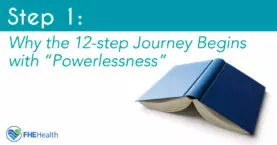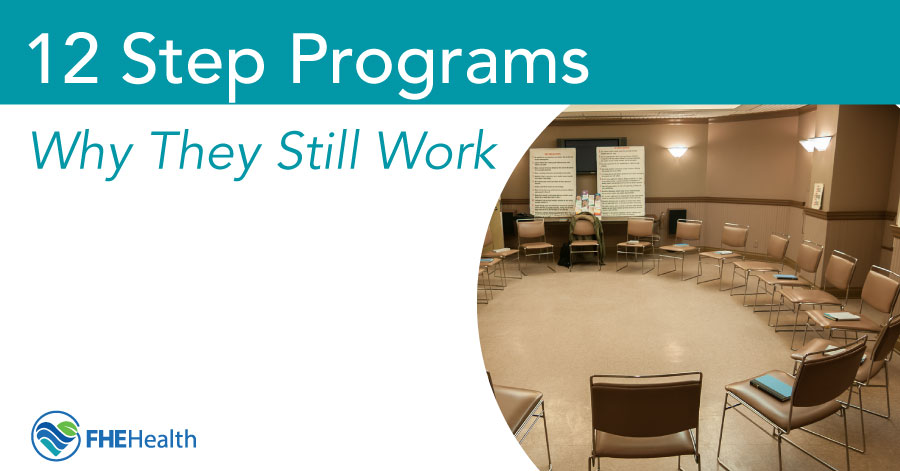
A 12-step program is one component of drug and alcohol treatment for those who suffer from addiction. This model of treatment has been heard of by many people through organizations such as Alcoholics Anonymous. Some may not believe this treatment program is right for them, but there is evidence that it works well to help people to get back on track to living a healthy lifestyle.
The National Survey of Substance Abuse Treatment Services from 2013 found that about 74 percent of all treatment centers in the U.S. use 12-step program models at least in part. FHE Health uses 12-step programs as just one part of your treatment program.
What Are 12-Step Programs, and Where Did They Come From?
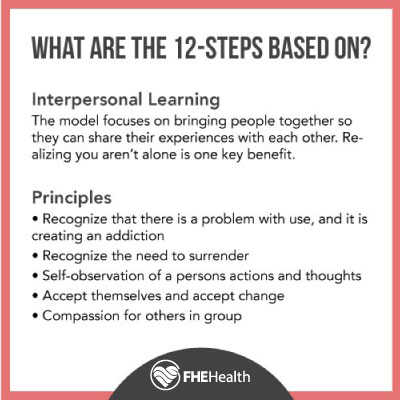 The first development of this type of treatment model began around 1938. It was developed by Bill Wilson through Alcoholics Anonymous. Initial ideas for the program came from Wilson’s own experiences and his long-term vision, as well as from treatments used by Wilson to help others.
The first development of this type of treatment model began around 1938. It was developed by Bill Wilson through Alcoholics Anonymous. Initial ideas for the program came from Wilson’s own experiences and his long-term vision, as well as from treatments used by Wilson to help others.
The Big Book was later published, explaining how the program works and providing a wide range of ideas on why it works. The original model had a strong spiritual and Christian inspiration, and many programs still employ that model.
What Is the Premise of the Success of a 12-Step Program?
The goal of the 12-step model is to help people to abstain from substances or behaviors that are addictive. To do this, the model focuses on bringing people together so they can share their experiences with each other. Realizing you aren’t alone is one key benefit.
Another key benefit is called flourishing, which occurs when there is a long-term period in which people abstain from the substance. Those who are involved in this type of model are more likely to flourish for longer periods and more often than those who do not.
To accomplish this, 12-step models sometimes focus on a higher power aiding in the process. In all cases, the program includes aspects of the following:
- An ability to recognize and admit that there is a problem with their use and that this is creating an addiction
- The need to surrender to the presence of the addiction and then make a decision to control the situation
- A component of self-observation of a person’s own actions and thoughts, often with a goal of helping them to achieve self-restraint
- Support to help a person to accept themselves and accept that they can change their behaviors
- A way of practicing and learning self-esteem-boosting skills
- Compassion from others within the group
Whether religious or not, the 12-step model has a strong goal of focus on the person and their needs, although there are numerous variations.
Do the 12-Step Programs Do More Harm Than Good?
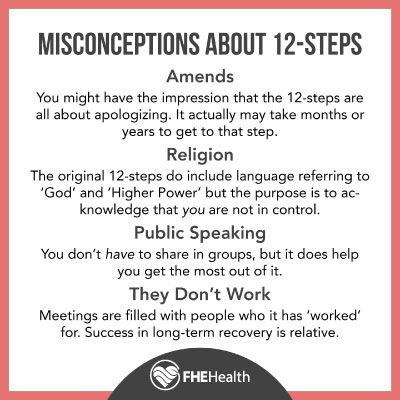
One question to ask your doctor is about the good and the bad of any type of treatment program you decide on. Some people believe these programs do some harm and that other treatment programs are a better fit instead.
Some have the opinion is that 12-step programs are ineffective because they focus on the person’s past destructive behavior. For example, the person must always refer to himself as an addict or an alcoholic, which some consider fatalistic and not empowering.
Regardless of the exact steps of the 12-step program, at its core is self-examination. Any substantial long-term recovery is going to require a deep look into the route taken that has brought you to where you are now. Whether it is done through a structure of individual therapy, or 12-step support, it is a journey that is almost certainly necessary.
It’s important to speak to your doctor and your counselor about your health, such as how long-term use of alcohol or illicit drugs can affect you. How is your life currently being impacted by your use?
Why Is AA Always Recommended for Drug and Alcohol Treatment?
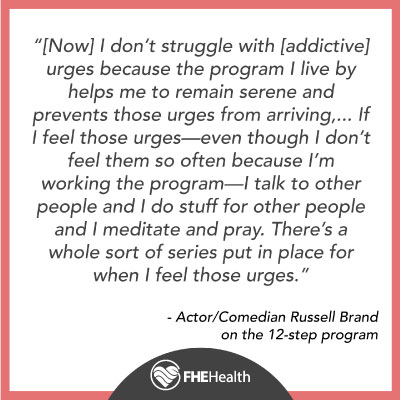 AA and the 12-step program model is not always the best option for individuals. There are other treatment models that may be more effective. It’s hard to say how effective AA can be for any one person. Some studies claim that as many as 75 percent of members are abstinent and stay that way. Others say the rate for success is much lower.
AA and the 12-step program model is not always the best option for individuals. There are other treatment models that may be more effective. It’s hard to say how effective AA can be for any one person. Some studies claim that as many as 75 percent of members are abstinent and stay that way. Others say the rate for success is much lower.
Some men and women who enter into AA are only getting a component of the treatment they need, and that could be a problem. People with mental health disorders may not be receiving the necessary care. In addition, these programs don’t consider the reason a person started using in the first place. If trauma or depression is a starting point to addiction, dealing with that underlying health concern is necessary for recovery.
For still others, AA is just the initial level of therapy they receive to improve their health. Without ongoing medical care or mental health treatment, that person may not be able to sustain long-term sobriety.
Is a 12-Step Program Right for You?
As with most types of disease, those who have a substance use disorder need a customized treatment plan to achieve recovery. The 12-step program can be a very good place to begin and tends to be at the heart of the success people have. However, it’s more effective when the person is also getting care for their mental health disorders or physical health needs.
This includes individual and group therapy sessions, one-on-one support programs with local areas and even brain training. The most important component of success in a 12-step program is ongoing support. Once a person leaves treatment or no longer attends meetings, it can be very difficult to maintain long-term health and sobriety. A customized treatment plan tends to be the best first step after detox occurs.
Seeking Out Care for Addiction from FHE Health
The 12-step program is something we offer at FHE Health as a component of the services we offer. It’s never the only type of care offered, though. When you or your loved one enters into treatment, detox and a full assessment are the starting point. Then, a customized plan is developed to address the specific needs of the individual him or herself. FHE Health is available to meet each of your goals in this way.
Further Reading: See our articles on…
- Step 1: Why the 12-step Journey Begins with Powerlessness
- Step 2: What is a Higher Power?
- Step 3: God as you Understand Him
- Step 4: Your Moral Inventory
- Step 5: Admitting Your Wrongs
- Step 6: Addressing Character Defects
- Step 7: Removing our Defects
- Step 8: Willing to Make Amends
- Step 9: Making Amends, How to Approach Step 9
- Step 10: Ongoing Inventory
- Step 11: How to Deepen Your Connection with a Higher Power
- Step 12: Sharing Your Spiritual Awakening With Others
- Understanding AA Lingo
- The Principles of AA
